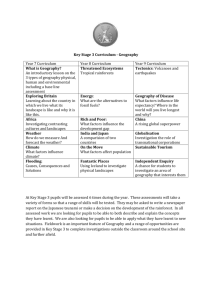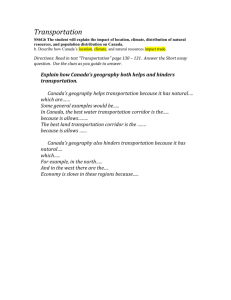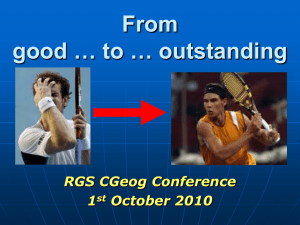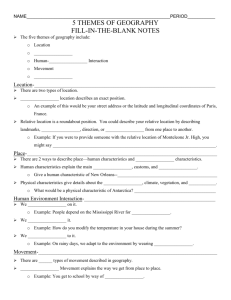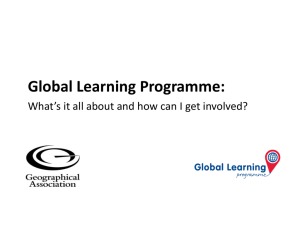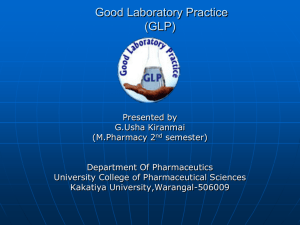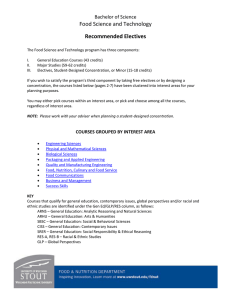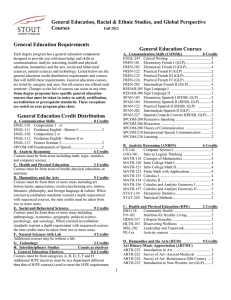Presentation - Geographical Association
advertisement
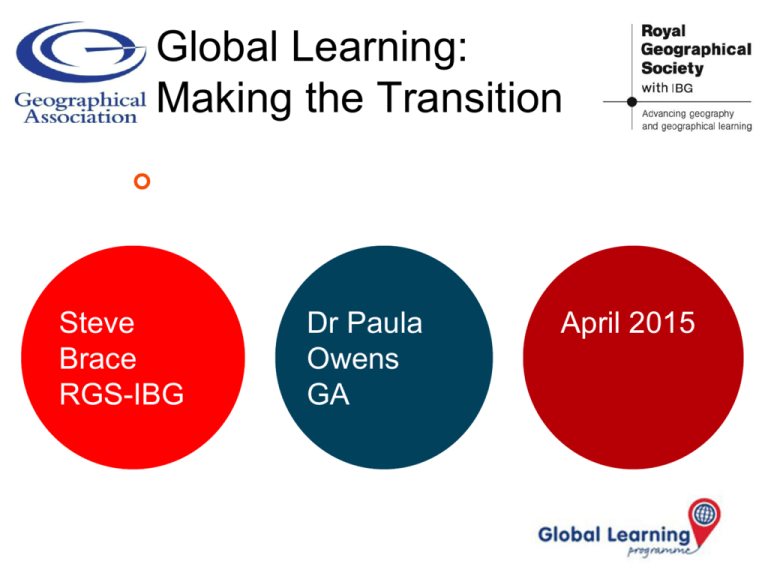
Global Learning: Making the Transition Steve Brace RGS-IBG Dr Paula Owens GA April 2015 The Global Learning Programme 2013-18 2000 schools already involved Led by Pearson in collaboration with: Dev Ed Research Centre (IOE), GA, Oxfam, RGS-IBG, Think Global & SSAT The focus is on (English) schools KS2&3 – as Expert Centres or Partner Schools, Supported by the UK Government Subjects an important context for GL GLP Aims Understand an interdependent world & explore strategies to make it more just and sustainable Knowledge of developing countries, their economies, histories and geography Interdependence, development, globalisation & sustainability Different models of dev. & sustainability From ‘charity’ to ‘social justice’ Enquiry & critical thinking GLP Progress Suite of progression materials to support global learning and geography planning and assessment Development of the Quality Mark framework to complement the GLP and new Ofsted Framework Ongoing CPD and resource materials for GA consultants and Champions to better support global learning and Transition Projects. Ongoing network support and development Exemplification of successful global learning Articles in GA journals Primary Geography Global Learning Special Summer 2015 Some Key Issues in Global Learning 1. Understanding and Progression e.g. what is globalisation and what does it look like in Year 3 or Year 9? What about KS1? 2. High-quality Geography e.g. How well does geography contribute to global learning? Is it of a high quality? How do we know? 3. Critical Thinking How? Balance? and Values e.g. What? When? 4. Impact e.g. What impact is our teaching having on our pupils / students Understanding and Progression Whole School Progression in Global Learning ... begin to make connections between ... ... building up their knowledge of the wider world and of diverse places, societies and cultures... .... Through investigating issues such as patterns of global poverty, uneven development and sustainability .... Coherence with geography assessment. See GA Guidance on Assessment And Benchmark Expectations High - Quality Geography Coherence between the Geography Quality Marks and the GLP Whole School Audit ...the opportunity to critically assess the teaching and learning of geography ... S.Teacher Tamworth ...a really good understanding of the strengths and areas for development of the subject across the school. P. Teacher Worcester Staff and students alike are proud to be geographers and identified as such. S. Teacher London Critical Thinking and Values Enquiry and critical thinking? Values? Global Learning Other Skills? Knowledge and understanding 8 Global Learning a framework Specialised vocabulary that gives entry into specialised conversations about the world Core, geographical Knowledge Classifications, typologies and terminologies Names of countries, continents, places and associated locational knowledge. Enabling, factual Names of features and processes. Core knowledge alone is not enough Global Learning a framework ‘Content’, contextualised knowledge. Linked to values Essential for decision – making, understanding impacts Cultural knowledge Requires empathy and tolerance Might be – and often is – contested knowledge What is it like to take a different view? Cultural knowledge alone is not enough Global Learning a framework Asks questions – often difficult ones Retains flexibility of thought and is open to new ideas and evidence Focuses possibilities Critical Thinking Supports ability to make well – informed decisions and take action to maintain or change a situation. Challenges stereotypes Considers multiple sources of evidence Critical thinking alone is not enough Knowledge Values Critical thinking Knowledge Knowledgeable about facts .Little capacity for empathy or action. Lacks global view Values Critical thinking Lacks knowledge capacity to inform decision – making. Strong on participation but tokenistic and one sided. Could be opinionated but 12 lacks empathy and knowledge Global Learning a framework Core, Knowledge Critical Thinking Cultural Knowledge UNDERSTANDING and Uncertainty 13 Transition Project KS 2 – 3 £500 per school, 25 – 30 schools per year during GLP Evidences learning linked to one or more GLP concepts (knowledge) and critical thinking Evidence of impact Find out more Model UN conference: Climate Change Core, factual knowledge Pupils and students learnt about the basics of climate change ...and then researched different countries ... Cultural global warming from an environmentalist view, knowledge global warming from an industrialist view. A lesson on how to write a policy.... A debate... Critical thinking Based on Transition Evidence St Francis Primary Impact on children With help from the sixth form students we created a presentation in which we had to talk about climate change. I found this a lot of fun as we had a chance to answer questions that the audience had for us. Extract from Transition Evidence St Francis Primary Investigating the Global Fashion Industry Question 1: Where are clothes made? Question 2: What is life like in the countries where clothes are made? Question 3: What are the working conditions like in the factories where the clothes are made? You need to make other aware of ... poor working conditions and ... very low wages. You also need to make them aware of how their lives could be improved and encourage them to get involved. Charity is not always the best solution. Why might it not work? Think critically. From Transition evidence Zouch Primary and Wellington Academy Blogging about Global Learning Starter activity: Thinking about Mia’s Story. Pupils sharing the book together and discussing the places mentioned in the story, namely Mia’s village, the Andes mountains and the city of Santiago, within their small groups (consisting of both Key Stage 2 and 3 students). I have really enjoyed today’s workshop because it was fun teaching and helping other pupils use the resources. I myself have also learnt a lot through teaching about Chile and Santiago. This project facilitated by one of the GA ‘Geography Champions’. From Transition Evidence Katharine Lady Berkeley’s School Global Learning Matters Comments from children aged 9 – 13 (and see Primary Geography GLP special summer 2015) show the ongoing need to challenge a charity mentality and extend understanding “There may be a natural disaster waiting to happen and you do not want to be in a place when it is happening.” “Children should be taught about how other poor people live their lives and how we can help them. How we can best help them with their problems and issues.” “You also need to learn about things like Ebola or wars in places like Syria because then you can try and help by donating to charities.”

